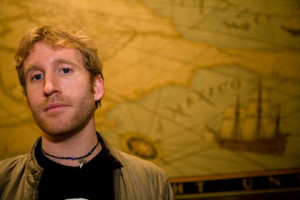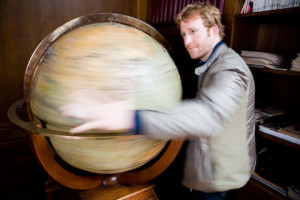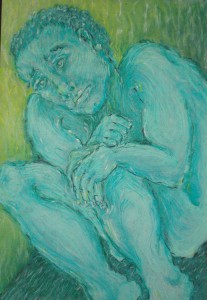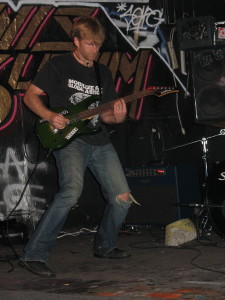By Daniel Karlin, Contributing Writer. Monday, April 9, 2007
 LONELY PLANET. Peter Maybarduk promotes social change both as a student at UC Berkeley’s Boalt Law School and as a singer-songwriter. He addresses the loneliness of a transient society in his debut solo album: http://archive.dailycal.org/article.php?id=24086
LONELY PLANET. Peter Maybarduk promotes social change both as a student at UC Berkeley’s Boalt Law School and as a singer-songwriter. He addresses the loneliness of a transient society in his debut solo album: http://archive.dailycal.org/article.php?id=24086
The first sound we hear on Cal student Peter Maybarduk’s debut album is a familiar one: a high pitched mechanical whine, and a voice—almost human but not quite—calling out “8-car Richmond train. Now boarding. Platform 1.”
Then comes a soft voice saying, “Hello. Hello. Hello.” It’s someone checking the mic, greeting people he’s never met—reaching out to anyone, searching for anybody out there, inviting them to join him.
The sounds of the incoming BART train blend with a synthesizer, an acoustic guitar kicks in as the doors open, and the voice calls out to us: “Come inside, I’ve a story to tell.” The doors close and we’re off—on a journey with Peter Maybarduk, on his debut solo album Passengers.
“I wanted to tell a story with these songs,” Maybarduk said. “It could be one person traveling through the Bay Area and how they’re experiencing everything passing by.” On Passengers, the waves of the marina, yells of children’s playgrounds and tolling of the Campanile are interspersed between the Elliot Smith-style songs, carrying us on a journey right by Maybarduk’s side.
In fact, traveling is a recurring theme i n Maybarduk’s life. Born to an American diplomat living in Mexico City, Maybarduk has lived in Nicaragua, Sierra Leone, Cuba and Venezuela. In the United States, he’s lived in Washington, D.C., attended a reform school in New England and the College of William & Mary, all before coming to UC Berkeley’s Boalt Law School. Currently in his final year at Boalt, Maybarduk is working as a law fellow in D.C. while also playing venues along the East Coast.
n Maybarduk’s life. Born to an American diplomat living in Mexico City, Maybarduk has lived in Nicaragua, Sierra Leone, Cuba and Venezuela. In the United States, he’s lived in Washington, D.C., attended a reform school in New England and the College of William & Mary, all before coming to UC Berkeley’s Boalt Law School. Currently in his final year at Boalt, Maybarduk is working as a law fellow in D.C. while also playing venues along the East Coast.
With law school and a music career going on simultaneously, the question arises: How do the two come together?
Rather than occupying wholly separate spheres, Maybarduk said he felt music and law can accomplish “different but mutually helpful things. They’re really just two courses, two occupations, two passions towards making change.”
And Maybarduk is devoted to change. His current fellowship is with Essential Action, an NGO dedicated to increasing accessibility of essential medicines in developing countries. After graduation, he said he plans to continue in the legal field, striving for progress in public health, while also continuing with his music to address social ills.
In that way, his two endeavors go hand in hand. “We can change the regulations of institutional structures, and we can change the mind of the person sitting right next to us,” Maybarduk said.
With this debut album, he takes on a social is sue with a deep personal significance.
sue with a deep personal significance.
“I wanted Passengers to be more than a collection of songs,” Maybarduk said. By channeling his experiences and emotions from his journeys, the album conveys a sharp sense of the loneliness of travel. “We’re quite transient as a society … and it’s a social ill, this transience,” Maybarduk said. The separation between all of us in society shines through as a central theme.
“We’re not the only ones/Who feel alone,” he sings on opening track “Passengers.” “Yet we hide in the masquerade/We hide in the rivers of stone./ And we  ride just like passengers/ Damned to never go home.”
ride just like passengers/ Damned to never go home.”
From his time in the local indie rock band Last Clear Chance, to his current phase as a singer-songwriter, Maybarduk’s music has always been an instrument dedicated to social change. On Passengers, his lyrics, strumming guitar and voice invoke us to join him, calling us to journey with him to somewhere new.

